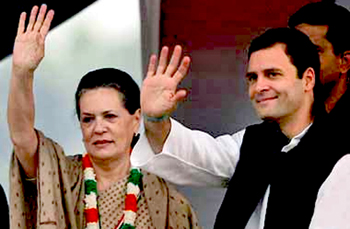
New Delhi, Jan 14: The Congress, reeling under a series of defeats in recent elections, has now pegged its hopes for its revival through an agitation against the “dictatorial tendencies” of the Narendra Modi government, particularly the ordinance to amend its pet land acquisition law.
The Congress Working Committee (CWC), the party’s top decision-making body, on Tuesday decided to oppose amendments to the land acquisition law across the country.
The main Opposition party is also angry with the ordinance route adopted by the government to amend several crucial laws.
“This government has effectively destroyed the landmark legislation and brought back the law passed by the British in 1894 through the back door,” Congress president Sonia Gandhi said in her opening remarks at the CWC meeting.
The party has directed all its state units to launch a protest. Former Union minister Jairam Ramesh, the architect of the land acquisition law which the Centre has amended, is expected to join the protests in Bhatta Parsaul, Uttar Pradesh, on Wednesday, where Congress vice-president Rahul Gandhi led a similar agitation in 2011. The protests, “Chetana Abhiyan”, will be confined to the states.
The Congress slumped to its worst ever defeat in the Lok Sabha elections by managing to win just 44 seats. “Back to the people” was Sonia’s mantra for reviving the party’s fortunes.
Sonia voiced her concern over the raw deal meted out to the farmers by the Centre’s policies which, according to her, has “sown the seeds of acute agrarian distress”.
The plan for protests comes at a time when even President Pranab Mukherjee has voiced concerns over the slew of ordinances promulgated on the advice of the government soon after the conclusion of the winter session of Parliament.
Mukherjee had summoned ministers seeking explanation on the urgency for promulgating ordinances, particularly those amending the land acquisition law and another related to regularising e-rickshaws in the national capital.
He has also conveyed to the ministers to think twice before promulgating ordinances.
Apparently chastised by criticism of the “Ordinance Raj”, the government has decided against amendments to laws through the ordinance route.
The government had maintained that urgent steps were necessary to send a signal to investors about the seriousness of the administration on ushering in economic reforms which were stalled by the Opposition in Parliament.
Since it assumed office on May 26, the Centre has issued 10 ordinances ranging from raising the foreign direct investment cap in the insurance sector, diluting the land acquisition law to opening up the coal sector and legalising e-rickshaws.






Comments
Add new comment